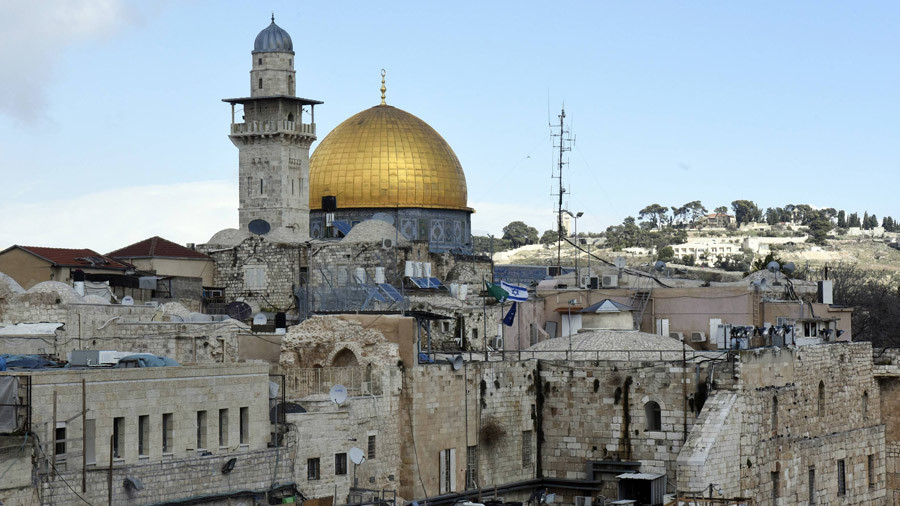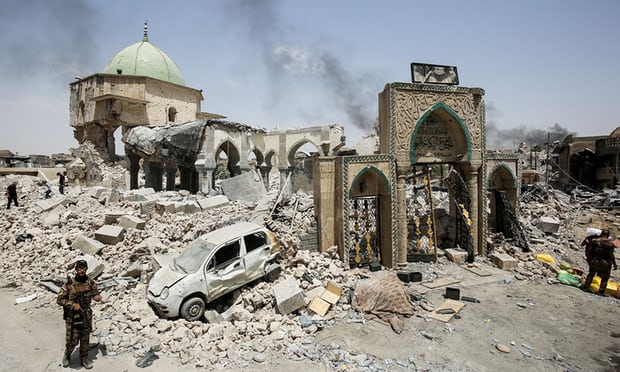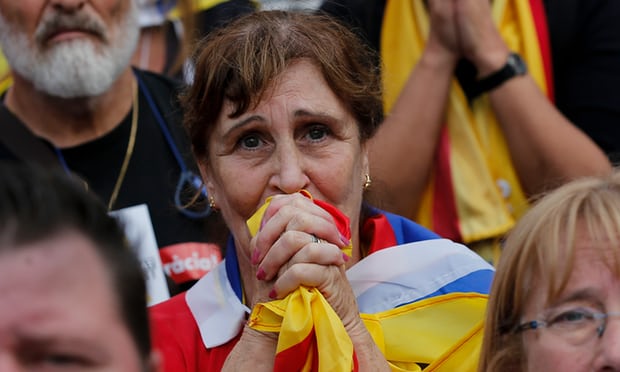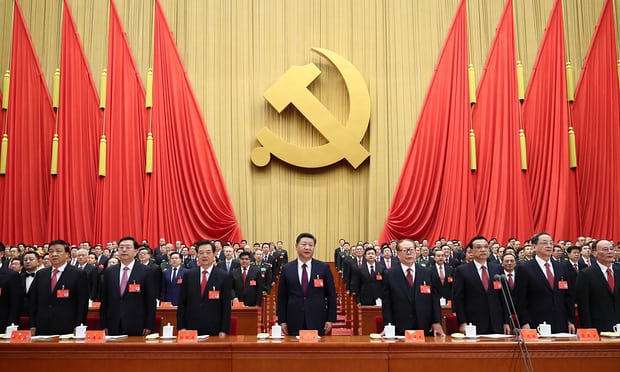The extraordinary spectacle of Donald Trump’s presidency has dominated 2017: from Twitter wars with nuclear-armed North Korea, to Robert Mueller’s Russia inquiry, and the fast-shifting White House cast, including several who encouraged Trump in his embrace of the far right.
Rohingya refugees forced to flee Myanmar

Rohingya Muslim refugees newly arrived in Bangladesh from Myanmar in September. Photograph: K M Asad/AFP/Getty Images
The world has grappled in recent years with a succession of serious refugee crises, from Sudan to Syria. But violence in Myanmar triggered an exodus on a scale and speed that dwarfed anything seen for decades.
The horror began in late August when insurgents from the oppressed Rohingya minority attacked state security forces. In response, authorities unleashed a wave of indiscriminate killing, rape and destruction on the civilian Rohingya population, so devastating that it forced more than 650,000 to flee the country, the majority into Bangladesh.
That is thought to be more than half the Rohingya population living in Myanmar, where authorities deny them citizenship and have not provided up-to-date population numbers. They risked their lives to cross rivers on flimsy boats and rafts, to be forced into squalid, overcrowded Bangladeshi camps, short on supplies and at risk of disease.
Yet even these grim conditions are better than the terror they fled. More than half of the refugees are women and children, probably because men are more likely to have been killed.
The attacks have been so extreme that the UN’s top human rights official, Zeid Ra’ad al-Hussein, has said that genocide cannot be ruled out. The Rohingya are mainly Muslim, the Burmese state is Buddhist-dominated – and this orgy of murder has come after years of extreme discrimination.
Adding to global outrage has been the silence of Myanmar’s de facto leader Aung San Suu Kyi, a Nobel peace laureate once almost universally admired as a moral beacon. She is credited with breaking the grip of a military junta which ruled her country for decades, at great personal cost, including enduring years of house arrest and separation from her family. Yet after years insisting that human rights are a universal birthright, she appears to have decided to separate the suffering of the Rohyinga from that of other peoples, brushing aside or ignoring the growing evidence of terrible abuse and refusing to condemn the military.
Trump's recognition of al-Quds as Capital of Israel

Al-Quds, Global Look Press
Donald Trump recognized al-Quds (Jerusalem) as the capital of Israel in December. Trump's decision faced a huge backlash even from the traditional allies of the United States. Since then, protests have continued across the occupied West Bank, East al-Quds, and the Gaza Strip over Trump's controversial decision.
The United Nations general assembly later delivered a stinging rebuke to Donald Trump, voting by a huge majority to reject his unilateral recognition of al-Quds as Israel’s capital.
The vote came after a redoubling of threats by Nikki Haley, the US ambassador to the UN, who said that Washington would remember which countries “disrespected America by voting against it.
Despite the warning, 128 members voted in favour of the resolution supporting the longstanding international consensus that the status of al-Quds– which is claimed as a capital by both Israel and the Palestinians – can only be settled as an agreed final issue in a peace deal. Countries which voted for the resolution included major recipients of US aid such as Egypt, Afghanistan and Iraq.
Only nine members– including the United States – voted against the resolution. Israel also voted against it. The other countries which supported Washington were Togo, Micronesia, Nauru, Palau, Marshall Islands, Guatemala and Honduras.
Changing of the guard in Africa

Zimbabweans cheering Mugabe’s resignation in November. Photograph: Marco Longari/AFP/Getty Images
Zimbabwe had known only one leader since independence in 1980 and, even when he turned 93 this year, Robert Mugabe insisted he had no plans to step down. His wife, Grace, even suggested he could fight elections from beyond the grave.
But as the year drew to a close, the man whose intellect and political instinct had kept him in power for nearly four decades miscalculated. He tried to fire his vice-president and former close aide, Emmerson Mnangagwa, to clear the way for Grace.
On 15 November, Mnangagwa’s allies launched a largely bloodless coup, although even as tanks and soldiers took up positions around Harare, everyone involved denied there was a military takeover under way. It was simply an intervention to save the president from himself.
Mugabe agreed to step down. It is unclear how much change Mnangagwa will bring, as most accusations of human rights abuses and corruption levelled against Mugabe could also be made against his successor.
But for many Zimbabweans, after so long under one ruler, the prospect of any change was intoxicating. Mugabe ran the economy so badly that even modest shifts in policy could mean significant improvements in living standards for many.
Beyond Zimbabwe’s borders, citizens of other nations, weighed down by decades of strongman rule, found inspiration in Mugabe’s downfall, at the end of a year of change. The coup came soon after Angola’s José Eduardo dos Santos chose to step down after 38 years as president and less than a year after Gambia’s Yahya Jammeh agreed – under military pressure from neighbours – to relinquish power and head into exile.
There is little question that other long-serving African leaders, from Uganda’s Yowerni Museveni to Rwanda’s Paul Kagame, will be pondering the fate of their peers. Critics hope they will conclude it is better to leave power on terms they can set, rather than cling on and end up like Mugabe.
Isis severely wounded in Iraq and Syria

Iraqi forces at the Great Mosque of al-Nuri in Mosul in July. Photograph: Ahmad Al-Rubaye/AFP/Getty Images
After bitter, months-long battles Isis was finally ousted in October from the cities that had formed the heart of its self-declared caliphate, Raqqa in Syria and Mosul in Iraq.
In both places its fighters dug in among residents, using people who had stayed on as human shields, and laced roads and homes with booby traps. Their tactics, combined with widespread use of US air strikes against targets that were not always well checked, meant there was a heavy civilian toll in both countries. The end of Isis’s territorial dream was celebrated on both sides of the Iraq-Syria border that its fighters once crossed with impunity. But few, particularly in Baghdad, in the army or in government think the battle against the group is ended.
The extremist group grew out of insurgent roots and, as its territory shrank, militant fighters had begun to melt back into the countryside to prepare for guerrilla attacks or had headed overseas. Abroad, Isis aims to sow terror by training fighters and inspiring others to launch their own violence. Even if largely subdued in what was once its heartland, Isis has branch units from Afghanistan to Yemen, feeding on those conflicts.
Its reign has left deep scars behind, particularly in Mosul and the surrounding Nineveh plains, once among the most religious and ethnically diverse parts of Iraq. Divisions are likely to take decades to heal and some Christians and Yazidis have said they do not want to return.
Seven years after the so-called Arab spring, hopes of greater democracy and openness have been mostly replaced by fear of chaos and violence, with civil wars spiralling into ever greater levels of brutality. The Syrian president Bashar al-Assad and his backers are largely back in control of the main urban centres, but the war is likely to flicker on for years and many millions of refugees who fled are too frightened to return to live under his rule.
Yemen has also suffered particularly badly, the violence compounded by famine and the worst outbreak of cholera in modern history.
Outrage as Trump flirts with the far right

Far-right activists in Charlottesville, Virginia, in August. Photograph: Samuel Corum/Getty
On the night of 11 August dozens of far-right activists with flaming torches marched through the university town of Charlottesville, Virginia, shouting slogans of hate. The next day a man rammed his car into a group peacefully protesting against the white supremacists, killing the 32 year-old civil rights activists Heather Heyer and injuring 19 others.
President Donald Trump responded, after a long silence, by accusing both white supremacists and the peaceful protesters of aggression. “You had people that were very fine people on both sides,” he said in an extraordinary news conference, that for many marked the moment when the resurgent far right – often rebranded as “alt-right” – went mainstream.
There had already been concerns on the campaign trail about language and advisers, particularly Steve Bannon, former editor of rightwing Breitbart website. The future president seemed barely ambivalent about a KKK endorsement, he attacked Mexicans, tweeted a purported Mussolini quote and called for a ban on Muslims entering the US. As president, his top policy priorities have including pushing for a travel ban focused on Muslim-majority countries. His positions have been supported by an army of politicians and commentators espousing views that would once have been considered extreme enough to have ended a career.
The new US ambassador to the Netherlands, a self-described expert on the “threat of radical Islam”, claimed that Amsterdam had no-go zones and cars and politicians were being set on fire. Across the Atlantic ideological supporters included writers such as Katie Hopkins, who called for a “final solution” after the Manchester attacks. Hopkins, who has also called migrants “cockroaches” in a column in the Sun newspaper, later said the post was a “typo” and replaced “final” with “true”.
Months after Charlottesville, Trump would retweet anti-Muslim messages from the far-right group Britain First. Less than two years earlier the killer of the Labour MP for Batley and Spen, Jo Cox, Thomas Mair, had shouted “Britain first” as he attacked her. Trump defied criticism from world leaders including Theresa May to leave the offensive videos up. They only finally disappeared when Twitter took down the accounts of Britain First leaders Jayda Fransen and Paul Golding, under new rules banning hate speech.
These are no longer fringe actors. In September the New York Times asked a question that would once have seemed unthinkable for the 21st century: ‘Is the president a white supremacist?’
Catalonia’s short-lived independence and the EU

Catalonia’s referendum in October. Photograph: Pau Barrena/AFP/Getty Images
Catalonian separatists made a decades-long dream a reality in October, if only briefly, passing a declaration of independence in the regional parliament.
Madrid (bloodlessly) seized back control almost immediately. And after a defiant victory stroll round his hometown, Carles Puigdemont, the ousted president of the republic or the region – depending on your viewpoint – fled to Brussels, seeking European support.
He found little backing – both the union and its member states have stood firmly behind Madrid. Catalonia’s independence bid was a headache the European Union could do without, in a year of strains and fragmentation.
The messy Brexit negotiations have proved more painful for London than for Brussels, but they have underlined the loss of an economic and political power most members would have preferred to keep inside the union.
The populist triumph claimed by Brexit supporters has inspired Europeans with breakaway dreams even as far away as Hungary, still highly dependent on EU funds.
And in Poland the ruling Law and Justice party is turning away from liberal democracy, with incursions on judicial independence that prompted the European commission to trigger the “nuclear option”, a process that could see the country stripped of voting rights in Brussels.
China’s president becomes all-powerful

Xi Jinping at the Communist party congress in October. Photograph: Xinhua / Barcroft Images
President Xi Jinping was enshrined as the most powerful Chinese leader since Mao Zedong, set to shape the world’s second-largest economy for years and possibly decades. At a landmark meeting in October the Communist party added his “political thought” to its constitution, an honour not accorded even to Deng Xiaoping in his lifetime.
Xi also manoeuvred to keep the standing committee of the politiburo, China’s ruling body, free of anyone young enough to take over when his five-year term as president ends. That means that, in some capacity, he will remain in power beyond 2022, ending an informal but well-observed system of succession, brought in to increase stability in the post-Mao era under which presidents served for a maximum of 10 years.
Although Xi endured some of the worst horrors of Mao’s rule – as a boy his family suffered when his father was purged – the experience does not seem to have turned him against authoritarianism.
At home, he has consolidated power through ruthless campaigns against his rivals. He has also cracked down on human rights and civil society groups, including those without overtly political agendas such as feminists protesting against sexual harassment. He has built up an Orwellian security state in restive western Xinjiang province, home to the largely Muslim Uighur ethnic group, and China is constantly testing and strengthening online controls and monitoring systems.
Abroad, Xi has been equally assertive, boosting the state’s military reach in the South China Sea and bolstering economic influence and soft power from Africa to Latin America. However, he has struggled to rein in the nuclear ambitions of China’s unruly neighbour North Korea.
Deng’s admonition to “hide your capacities, bide your time” seems to have been set aside. Perhaps Xi judges the time has arrived for China to assume a more prominent global role. Certainly his consolidation of power will have worldwide ramifications. Despite serious challenges, particularly environmental, the economy keeps growing, the cost of confrontation with Beijing has risen steadily – and the appetite for it among trading partners has diminished.
(Photo: On the night of 11 August dozens of far-right activists with flaming torches marched through Charlottesville, shouting slogans of hate. Photograph: The Washington Post/Getty Images)